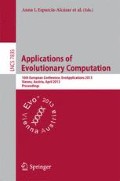Abstract
An approach using a genetic algorithm to optimize the scheduling of domestic electric loads, according to technical and user-defined constraints and input signals, is presented and illustrative results are shown. The aim is minimizing the end-user’s electricity bill according to his/her preferences, while accounting for the quality of the energy services provided. The constraints include the contracted power level, end-users’ preferences concerning the admissible and/or preferable time periods for operation of each load, and the amount of available usable power in each period of time to account for variations in the (non-manageable) base load. The load scheduling is done for the next 36 hours assuming that a dynamic pricing structure is known in advance. The results obtained present a noticeable decrease of the electricity bill when compared to a reference case in which there is no automated scheduling.
Access this chapter
Tax calculation will be finalised at checkout
Purchases are for personal use only
Preview
Unable to display preview. Download preview PDF.
References
Allerding, F., Premm, M., Shukla, P.K., Schmeck, H.: Electrical Load Management in Smart Homes Using Evolutionary Algorithms. In: Hao, J.-K., Middendorf, M. (eds.) EvoCOP 2012. LNCS, vol. 7245, pp. 99–110. Springer, Heidelberg (2012)
Du, P., Lu, N.: Appliance Commitment for Household Load Scheduling. IEEE Transactions on Smart Grid 2(2), 411–419 (2011)
Gomes, A., et al.: A Multiple Objective Evolutionary Approach for the Design and Selection of Load Control Strategies. IEEE Transactions on Power Systems 19(2), 1173–1180 (2004)
Gudi, N., et al.: Demand response simulation implementing heuristic optimization for home energy management. In: North American Power Symposium 2010, pp. 1–6. IEEE (2010)
He, Y., et al.: Optimal Scheduling for Charging and Discharging of Electric Vehicles. IEEE Transactions on Smart Grid 3(3), 1095–1105 (2012)
Koutitas, G.: Control of Flexible Smart Devices in the Smart Grid. IEEE Transactions on Smart Grid 3(3), 1333–1343 (2012)
Kwag, H.-G., Kim, J.-O.: Optimal combined scheduling of generation and demand response with demand resource constraints. Applied Energy 96, 161–170 (2012)
Livengood, D., Larson, R.: The Energy Box: Locally Automated Optimal Control of Residential Electricity Usage. Service Science 1(1), 1–16 (2009)
Lu, N.: An Evaluation of the HVAC Load Potential for Providing Load Balancing Service. IEEE Transactions on Smart Grid 3(3), 1263–1270 (2012)
Michalewicz, Z.: Genetic Algorithms + Data Structures = Evolution Programs. Springer (1992)
Mohsenian-Rad, A.-H., Leon-Garcia, A.: Optimal Residential Load Control With Price Prediction in Real-Time Electricity Pricing Environments. IEEE Transactions on Smart Grid 1(2), 120–133 (2010)
Molina, A., et al.: Implementation and assessment of physically based electrical load models: application to direct load control residential programmes. IEE Proceedings - Generation, Transmission and Distribution 150(1), 61 (2003)
Pedrasa, M.A.A., et al.: Coordinated Scheduling of Residential Distributed Energy Resources to Optimize Smart Home Energy Services. IEEE Transactions on Smart Grid 1(2), 134–143 (2010)
Pedrasa, M.A.A., et al.: Scheduling of Demand Side Resources Using Binary Particle Swarm Optimization. IEEE Transactions on Power Systems 24(3), 1173–1181 (2009)
Roe, C., et al.: Simulated demand response of a residential energy management system. In: IEEE 2011 EnergyTech, pp. 1–6. IEEE (2011)
Soares, A., et al.: Domestic load characterization for demand-responsive energy management systems. In: 2012 IEEE International Symposium on Sustainable Systems and Technology (ISSST), pp. 1–6. IEEE, Boston (2012)
Author information
Authors and Affiliations
Editor information
Editors and Affiliations
Rights and permissions
Copyright information
© 2013 Springer-Verlag Berlin Heidelberg
About this paper
Cite this paper
Soares, A., Gomes, Á., Henggeler Antunes, C., Cardoso, H. (2013). Domestic Load Scheduling Using Genetic Algorithms. In: Esparcia-Alcázar, A.I. (eds) Applications of Evolutionary Computation. EvoApplications 2013. Lecture Notes in Computer Science, vol 7835. Springer, Berlin, Heidelberg. https://doi.org/10.1007/978-3-642-37192-9_15
Download citation
DOI: https://doi.org/10.1007/978-3-642-37192-9_15
Publisher Name: Springer, Berlin, Heidelberg
Print ISBN: 978-3-642-37191-2
Online ISBN: 978-3-642-37192-9
eBook Packages: Computer ScienceComputer Science (R0)

